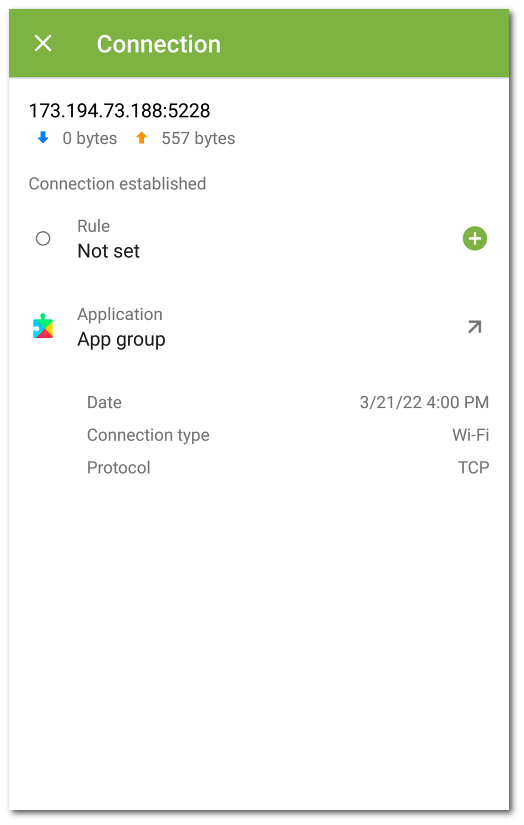Connection Rules
|
App traffic is managed through connections established by apps. You can set up allowing, blocking, or redirecting rules for connections with specified IP addresses and ports for every app installed on the device. Connection rules are displayed on the Rules tab of the Application screen, as well as on the All rules screen. General information on each connection is shown on the Connection screen (see Figure 30). To go to this screen, do one of the following: •On the Active apps screen, tap the •In the Firewall log: ▫When events are grouped by date: tap a connection row. ▫When events are grouped by app name: expand the list of app connections by tapping the •In an application log: expand the list of app connections by tapping the The Connection screen contains the following information: •connection address and port; •host name (if available); •amount of incoming and outgoing traffic received or transmitted by the connection; •connection status; •connection rule; •app that established the connection; •date and time; •connection type; •protocol. To copy a connection address 1.Tap and hold address line to enter a copying mode. The address will be highlighted in gray. 2.Tap the To exit the copying mode, tap the Connection rules Creating rules To create a new connection rule 1.For connections without rules: •On the Connection screen, tap the •On the Active apps screen, expand the list of established connections and tap the For any connection: •On the Application screen, open the Rules tab and tap the 2.On the next screen, select the rule type: • • • 3.Check the IP address/host name. If the address is not specified, enter a valid IP address (in the a.b.c.d format for IPv4 addresses or [a:b:c:d:e:f:g:h] for IPv6), an IP address range (in the a1.b1.c1.d1-a2.b2.c2.d2 or [a1:b1:c1:d1:e1:f1:g1:h1]-[a2:b2:c2:d2:e2:f2:g2:h2] format), or a network (in the a.b.c.0/n format, where n is a number from 1 to 32). If you are creating a redirecting rule, enter the redirection address in the field below. You can specify a host name instead of an address. 4.Tap More for the additional Protocol setting to choose a network protocol for the connection. 5.Tap the Apps with set connection rules are marked with the Viewing rules To view connection rules ▫Go to the Application screen and open the Rules tab. The tab contains the list of all rules set for the app, in the order of their execution. 1.On the main Firewall screen, tap More on the All applications section card. 2.On the All applications screen, tap Menu The All rules screen contains the list of all connection rules grouped by the name of the app (or app group) that established the connection. Apps are sorted in alphabetical order. To expand the list of rules of an app, tap the To change the order of rule execution •Tap and hold the To search through all app rules •Tap the App rules can be stored on the device for the specified period of time after the app is deleted if the corresponding setting is enabled. Editing rules To edit an existing rule 1.Do one of the following: •On the Connection screen, tap the •On the Active apps screen, tap the •On the Application screen, open the Rules tab and tap the rule row. •On the All rules screen, tap the 2.Make changes. 3.Tap the Deleting rules To delete a rule •On the rule editing screen: 1.Tap Delete rule. 2.On your next step, tap Delete. •On the Rules tab or the All rules screen: 1.Swipe the rule left and tap the 2.On your next step, tap Delete. To delete all rules for a certain app 1.On the Application screen, tap Menu 2.On your next step, select the App rules check box. Tap Clear. To delete all rules for all apps 1.On the All rules screen, tap Menu 2.Tap Clear. Importing and exporting rules You can export rule lists to a file in the internal device memory. This allows you to import them from the file later (for example, in case you reinstall Dr.Web or use it on another device). To export rules to a file •For an individual app: 1.On the Rules tab of the Application screen, tap Menu 2.Tap OK. •For all apps: 1.On the All rules screen, tap Menu 2.Tap OK. Rules are exported to the DrWeb_Firewall_Rules_<app_name>.hsts file if these are app-specific rules, or the DrWeb_Firewall_Rules_ALL.hsts file if these are the rules for all apps. The file is saved in the Internal storage/Android/data/com.drweb/files/ folder.
To import rules from a file •For an individual app: 1.On the Rules tab of the Application screen, tap Menu 2.Locate the file with rules in the file tree and tap it. •For all apps: 1.On the All rules screen, tap Menu 2.Locate the file with rules in the file tree and tap it. Block all connections not allowed by the rules You can block all connections except for those allowed by rules for an app by selecting the corresponding check box on the app settings screen. |




